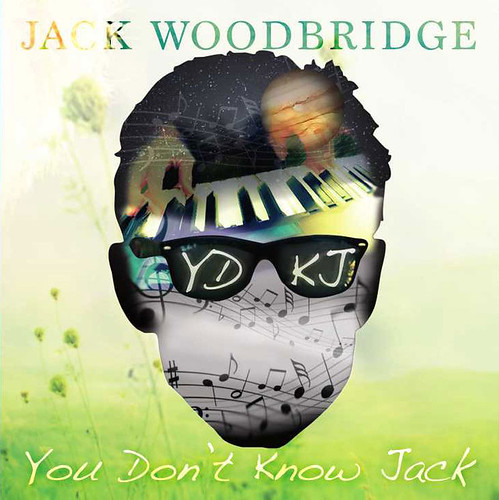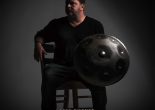Even after about three decades in the business, three solo albums, and countless performances from here to New York City, we’re still getting to know Jack Woodbridge.
Actually, he’s still figuring out who he is as well.
Releasing a new album called “You Don’t Know Jack” last Sunday at Duffy’s Coffee House in Clarks Summit, Woodbridge met NEPA Scene in another coffee shop, Northern Light Espresso Bar & Café in Scranton, to talk about his life, career, and the music that defines both.
It all began in 1963 when the nuns at St. Ann’s started teaching him piano in the second grade. Before long, a teacher who went to Juilliard started coming to his home in West Scranton every week, so by age 12, he wrote “Debbie Dear,” his very first song. By that point, music had him for life.
“I didn’t have the idea – it had me. It’s like how an actor will say he went to see a show on Broadway and he was like 10 and you’re bitten – you’re just hooked. As soon as I wrote songs, I would play them for some close, intimate friends, like I had guarded secret. ‘I wrote some songs,’ and I remember the reaction. I couldn’t stop writing if I wanted to. I was always thinking about songs, every day. In high school, I was writing lyrics,” Woodbridge recalled.
“I was hooked on ‘Tommy,’ the rock opera by The Who, and it was inevitable that I was going to write my own rock opera, so I started writing a rock opera. That’s all I wanted to do.
“It had me. It had me at hello. It was a love that I couldn’t get away from.”
By the time he was attending Penn State University, he had figured out a way to start capturing that love on tape, both audio and video.
“My roommate and I would make videos back in ‘70s before MTV. I would write songs and he would make a movie out of it. We would record on a big reel-to-reel tape, so that’s where it started,” he said.
“When I got out of college and then into rock ‘n’ roll, I heard about WVIA and (“Homegrown Music” host) George Graham. I started to go down there and record because he could do it for free.”
Taking his cues from Elton John, Billy Joel, and The Beatles, he didn’t just stick to writing poppy love songs – he wrote about everything.
“My heart was broken a lot, I broke a lot of hearts, and I was able to write lots of broken-hearted love songs. Also, I was kind of spiritual and introspective because I had lost my dad when I was 16, and it kind of sent me into this journey, so you start getting a little metaphysical,” he described.
“And funny. I had some funny songs. I like clever, funny lyrics, so I would write funny songs for my friends.
“For one of the sessions for George Graham, I wrote a song called ‘Terror’ because there were so many people getting shot. [John] Lennon had gotten shot, President Reagan, there was an attempt on him, the Pope, there was a shooting attempt, all in like a year or something. I would pick stuff up from the news. I was attuned to the news, and I would write things about what I saw going on in the world.”
His ability to write about virtually anything certainly helped his professional career, but it wasn’t as fulfilling as what he is up to these days.
“As an older guy now writing stuff for myself, it doesn’t just have to be about love. I considered myself a songwriter for 25 years in New York – not an artist. I was writing for other people, and most artists want some kind of love-based song,” he noted.
“Artistically, when I started to write in my own voice, I could go after whatever I really wanted.”

New York state of mind
At first, he moved to New York City in 1985 to pursue his art with a plan that quickly went awry.
“Music is like a strange possession, an addiction, and it makes you do crazy things like move to New York with $1,400 in your pocket and no job prospects, which I did. It wasn’t blind, though. I had as strong an interest as you could get from CBS Records with a guy named Tony Martell. … He was vice president of CBS and I had a personal contact with him. He opened the doors for me over in the publishing division. For two or three years, I was sending them material, and I had the audacity to be writing for Quiet Riot. They said, ‘Do you want to write some heavy metal Quiet Riot songs?’ So I started to do that, and then I had a contact into Cyndi Lauper and I wrote her drummer and things,” he said, though when he put in a call to check on his appointment with Danny Strick at CBS when he arrived in the city, his luck – and plenty of other things – had changed.
“The receptionist said, ‘Honey, you haven’t read the newspapers today, have you?’ I said, ‘No.’ ‘We were sold to the Japanese.’ Sony had bought CBS. She said, ‘This place is empty. There’s no one in any office here.’ I singlehandedly lost all of my contacts. I think I had a mini breakdown that afternoon. I thought, ‘Oh my God, what did I do? I’m here and you’re not!’”
Working in restaurants and painting scenery for off-Broadway shows to get by, he became a bartender three nights a week at Nirvana, a popular disco club in Times Square, after discovering that the owner’s wife was also from West Scranton. He served everyone from Hall & Oates to Christopher Reeve to John F. Kennedy Jr., so while he “wasn’t in Kansas anymore,” he wasn’t exactly where he wanted to be.
Asked to write music for scenes to be performed on a cruise ship, this led him to score the off-Broadway play “The Tale of Tyler T,” among other shows, and he later composed music for the short films of Brazilian director Flavio Alves and even a song for the New York City Marathon.
He had no formal training in these areas, crediting his producer Dean Bailin for understanding and following his creative process wherever it may go.
Finding Jack
After working for and performing on CNN with no records of his own to sell, Woodbridge thought it was time around 2004 to stop writing for others and start working with Bailin on some solo material, as thrilling as it would have been to work with Tony Bennett – it almost happened, but his heart wasn’t in New York City.
“People said, ‘Why are you waiting for Tony Bennett? Why are you waiting for anyone else to do your song? You sing, you play the piano – do it. So I took all of those demos that I had been making for years and through – I heard the word ‘magic encounters’ from a musician on NPR the other night – I met these people who said, ‘You should talk to Dean Bailin, who worked with Rupert Holmes and did ‘The Pina Colada Song.’ He would love your material,’” he said.
“I did. I got in touch with him; I sent him my demos that I had done for these singers. I said to him, ‘What could we do to put all these songs together into one album? You kind of mix them together and make them work.’ It was kind of like asking somebody to redesign Disney World. It was crazy. There were four or five different studios, four or five different formats, all of these crazy production levels, producers, engineers from all these different places – some of them sounded more produced than others. So we reinvented the wheel on these. Some of these we had to rerecord.
“I like to say it’s chock full of songs from people that almost recorded them.”
After throwing out some tracks and adding others, “Picture This” was born, a reference to the visual nature of his music. His follow-up, “Jack of Hearts,” was written under much different circumstances when he found out that he had a potentially life-altering tumor on his spine.

“I was in a study group in Washington in a hospital and I started to write the album in the hospital in my head. I didn’t have a piano in the bed with me, although there was a piano. I get the diagnosis; they said, ‘You’ve got to go home. We’re going to do surgery in 10 days,’ so I came back to New York, I went into the studio with Dean and said, ‘Set up the piano, set up a mic, and roll the tape,’” he remembered.
“I started to write like crazy, and I would record piano and vocal at lightning speed. I don’t know how many songs came out. I said, ‘If something happens after the surgery, they told me I might have to live in a rehab for like six months. At least we could be producing them over the phone.’ It was a very busy 10 days. I did the photo shoot for that album. I had to get a will together.”
The album, released in 2010, featured songs like “Second Chance” and “Turnaround,” evidence of his positive state of mind despite the circumstances. He still lives with chronic but manageable pain, having good days and bad.
“How could you not be writing from that metaphysical point of view when you think your life is going to be changed? It was changed, but not the way that they said,” he enthused.
“It’s like a coping thing. I think that’s what it is.”
I am Jack’s new album
If that was coping, then “You Don’t Know Jack” is living. After leaving CNN to be “gainfully retired” and take care of his mother back home in Scranton, his situation ended up being “a blessing in disguise,” allowing him to concentrate fully on his third full-length album and stretch some creative muscles, albeit in a cramped space as he traveled back and forth from New York to Scranton.
“This album was recorded and written on Martz buses, and I have the receipts to prove it,” he declared with a laugh.
“I would get out of the bus at Port Authority and go right to the studio and [Bailin] would say, ‘Well, what do you want to do today?’ and I’d say,’ I just came up with this.’ I remember writing ‘Good Day Jupiter,’ one of the tracks, the complete thing in my head, and I said, ‘Shh! Don’t speak.’ And he knew how to work with me. He’d set up the piano, he’d start running around the studio and setting everything up, and I’d say, ‘I think it goes like this.’
“In that way, it was very freeing because I’m just writing right out of here but also I’m very freed up because I have such a trusting relationship with Dean Bailin. It’s like I know what he’s going to do. He knows how wacky I can be, and he knows what’s going to come out of it.”
It took a year and half to record the album, so every time he exited the bus, he felt like a different person, leading him to capture these different personalities with each song.
“The different personality idea came up after it was put together because these songs were so disjointed. I said, ‘Dean, do you think we’re going to be able to pull this off?’ It sounds like AM radio in the late ‘60s – you could have The Cowsills, The Rolling Stones, Diana Ross, and you could have a country song,” Woodbridge pointed out.
“I didn’t really think so much if they were going to fit together because no matter what, we were going to make them fit, even if it sounds like a greatest hits collection. I trusted Dean. I knew he would pull this together. He always said to me, ‘The glue is that you still have your signature as a writer, and it’s still your voice.’”

He feels this collection of songs is much more upbeat, though he touches on serious issues like marriage equality and gun violence right next to the dance numbers and rock songs. He remained optimistic even after undergoing surgery for two tumors on his neck.
Just days after the procedure, he was back in the studio with gauze on his neck so he could work with “Blue” Lou Marini of the Saturday Night Live Band and the Blues Brothers. Woodbridge proudly pulled up pictures and videos of Marini playing on two of the album’s tracks.
“He really, really loved them. He really loved ‘99 Miles,’” he beamed. “He said, ‘This is an awesome lick.’ I’ll never forget him saying that.”
It’s easy to find something to appreciate in all 12 tracks, particularly since songs like the lead single, “It’s All in His Head,” warrant multiple listens and interpretations. The title comes from the fact that Woodbridge writes tunes in his head before even sitting down in front of a piano, but the lyrics run deeper.
“The inspiration for what it was going to be about lyrically is who is living up the street from you – is he a creative genius or is he a psychopath or a shooter? There were things happening in the world, and there still are, where not very nice people break into movie theaters and schools and people say, ‘God, he seemed like such a nice guy. He was just so sweet. He always had a smile,’ but what was going on upstairs?” he questioned.
“However, I didn’t want it to be creepy. It could be that kind of person, but there’s also very gifted people, and I think you see this in young kids. They’re like diamonds in the rough. You have to go in there and dig at them. They don’t bring it out in school. Teachers aren’t finding it; there’s no money for music education, arts – all that stuff has gone away. That isn’t in the song, but that’s what I was thinking. There are young people that have incredible things going on in their head. How do we bring it out?
“I provide no solutions in this song. I just bring up in the issue.”
Overall, “You Don’t Know Jack” doesn’t offer simple answers regarding Jack’s identity either, though he compared it to a memoir or even an exposé on his multiple artistic personalities.
“[The title] just came to me. It seemed funny. I like the snarky part of it. I also knew that on this record, if you had any preconceived notions about what I was like as a recording artist from the first two records, I’m going to really surprise you,” he explained.
“I think there’s a lot that people probably don’t know as far as the songwriter part of me, and maybe revealing more of myself as a writer. How can it not be autobiographical? I’m not writing for someone else.
“At the end of it, you might say, ‘I think I know who this guy is,’ or, ‘I think I’d maybe like to stay away from him.’ And maybe they’d say, ‘I can’t wait for his next record.’ That’s what I’d love.”
If that is the conclusion listeners come to, they won’t have to wait long. While Woodbridge is prepared to support this album with some upcoming shows, he’s already back in the studio working on a new song, still defining his musical personality – and legacy – at 58 years old.
“I’m jonesin’. I’m getting cranky here a little bit. I’m over on the marketing side for five months. You’ve got to throw be back in the water! I’m flipping around on the beach out here!”
by Rich Howells
Rich is an award-winning journalist, longtime blogger, photographer, and podcast host. He is the founder and editor of NEPA Scene.



